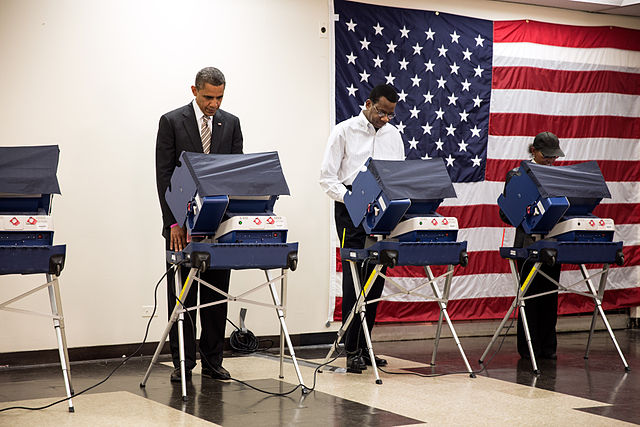President Obama casts his vote in the 2012 election. Ohio voters will do the same on Tuesday.
As primary election nears, Ohio’s 17-year-olds’ right to vote is challenged
March 14, 2016
Eligible voters in the state of Ohio will head to the polls this Tuesday to vote for a Democratic or Republican primary candidate along with state legislators and local congressional candidates.
In previous elections in Ohio, as well as in 21 other states and the District of Columbia, 17-year-olds have been allowed to vote in primary elections as long as they turn 18 by the November general election. However, 17-year-olds in the Buckeye state have had that right challenged recently.
Ohio Secretary of State Jon Husted announced that presidential primary votes from 17-year-olds will no longer be counted in this year’s election. Early voter absentee ballots from 17-year-olds should not be counted for presidential candidates, Husted told election officials.
Husted’s reasoning for this directive is that people are voting for delegates who pledge to candidates, and that 17-year-olds can’t directly elect an official.
Bernie Sanders, a Democratic presidential candidate, filed a lawsuit against the state of Ohio over this ruling. Many political experts believe Sanders is doing this because he needs the young voters to upset Hillary Clinton in the primaries.
Also fighting against the ruling was a group of six high school students across the state. These students filed a lawsuit against Husted.
“I welcome this lawsuit and I am very happy to be sued on this issue because the law is crystal clear,” Husted said in a statement in regards to the lawsuit.
As confident as Husted was about this issue, a Franklin County court blocked the Secretary of State’s ruling, allowing 17-year-olds who will be 18 by the general election to vote for presidential candidates this Tuesday.
This decision by Husted has certainly caused controversy in Ohio. At Solon High School, the Junior State of America club (JSA) has worked to register 17 and 18-year-old students for the primary and general election.
According to JSA adviser and AP Government teacher Bryan Ashkettle, his club has registered about 500 students to vote. Many of those students will not be 18 by the Ohio primary election and would have been affected by Husted’s ruling if it had stood.
Ashkettle, who was interviewed for this article before the court blocked Husted’s ruling, noted that the Ohio Secretary of State’s exclusive job is dealing with elections, and he wishes that Husted would expand the electorate.
“According to Husted’s interpretation, individuals aren’t voting for candidates, they’re voting for delegates and it’s a variation in interpretation. What is disappointing is that the previous Secretary of State allowed 17-year-olds in previous years to vote,” Ashkettle said.
Matthew Shafron, a junior at SHS who would have been affected by Husted’s ruling, voiced his displeasure.
“I was upset and infuriated. It was an unfair ruling. If another group of people such as African Americans or Hispanics were disenfranchised a week before an election there would’ve been a huge public outcry,” Shafron said. “The media attention was just not there for this issue. Once I got my voting rights back I felt that an imbalance in the political system had been restored. I look forward to voting this week.”
Along with Shafron, many other SHS students, including junior Dylan Caine, disagreed with Husted’s ruling.
“I think his ruling is immoral, and serves only to silence the voice of our generation,” Caine said. “It has absolutely zero justification behind it except to suppress our say in our democracy. I believe he doesn’t have the right to take that away from us. We shouldn’t let any politician bully us or tell us our voice does not matter.”
Upon speaking with several SHS students about this issue, it appears that there is a unanimous agreement among students affected that Husted’s ruling was unjust.
While most students had complaints to offer, JSA club president Akshay Jain, a SHS senior, urged 17-year-olds to get out and vote.
“It is absolutely essential for 17-year-olds to have a say in any national election because the results will end up influencing us,” he said. “Issues like education reform, social security reform, climate change policies and many more, all affect our lives in many different ways and because of that we should have a say as to how these issues are handled and who is the best person to get the job done.”
Anyone with questions about this subject can contact 877-SOS-OHIO for more information.
